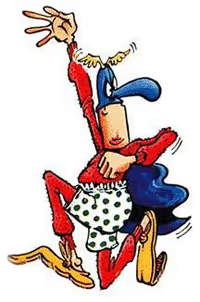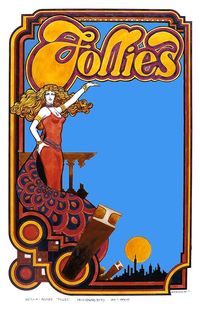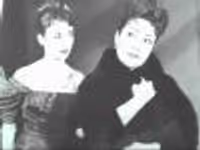FOLLIES: Thoughts...
#150FOLLIES: Thoughts...
Posted: 8/18/11 at 12:47am
^ Ohh my mistake! ![]() Thanks for clarifying!
Thanks for clarifying!
Gaveston2
Broadway Legend Joined: 6/28/11
#151FOLLIES: Thoughts...
Posted: 8/18/11 at 5:54am
Point of order, ALM: the writers of a Broadway musical OWN the material; they can't technically be fired.
Now Prince, wearing his hat as producer of Follies, could have demanded that Goldman rewrite to Prince's specifications. He might have even tried to bring in some other writer as script doctor. But in either case, Prince's only recourse would have been to close the show if the writers didn't agree. He couldn't literally fire Goldman or Sondheim.
(Per copyright law, each writer (book, lyrics or music) owns the entire work in partnership with the others. So neither could Sondheim decide to dump Goldman's book and bring in Hugh Wheeler. Writers are sometimes replaced on Broadway, of course, but they are bought out, not fired.)
This matters because it is the opposite of movies, where the producer and or studio owns the material and writers are hired and fired, often multiple times on a single picture.
But you are correct to the extent that Goldman, Sondheim, Prince and Bennett all had input into the eventual script of Follies, and all are responsible for the eventual show. Because he was the least well known, Goldman may well have had the least "muscle" of the quartet. So there is indeed something unfair about lionizing Prince, Bennett and Sondheim for all the good parts while blaming Goldman for everything that doesn't work.
I'm sure Pal Joey knows all this. When he says he blames James Goldman for all problems in Follies, Joey just means the fault lies in the book rather than the score or staging.
Updated On: 8/18/11 at 05:54 AM
#152FOLLIES: Thoughts...
Posted: 8/18/11 at 7:36am
Gaveston2 wrote: Point of order, ALM: the writers of a Broadway musical OWN the material; they can't technically be fired.
True, of course. Thank you.
In my defense, I'll say only that it isn't unusual to hear people talking about a member of a creative team being "fired" (say, John LaTouche in Candide or, more recently, Julie Taymor in Spider-Man), even though that isn't quite what happens.
And that "fired" sounds more fun than "firmly asked to resign".
Gaveston2 wrote: I'm sure Pal Joey knows all this. When he says he blames James Goldman for all problems in Follies, Joey just means the fault lies in the book rather than the score or staging.
No doubt. But that still leaves the problem that the person who wrote the score, and the person who directed the staging, apparently thought the book was worthy.
Granted, neither Sondheim's nor Prince's nor anybody else's judgement is always right. But in this case, we're talking about their judgement on a show where they both did some of their best work.
Updated On: 8/18/11 at 07:36 AM
#153FOLLIES: Thoughts...
Posted: 8/18/11 at 9:34am
Very nice post Redmustang, though I have to admit that when you wrote "These Broadway shows we love so much open one night, blaze with such fire, run their course, and close way too quickly. Then they're gone."
You reminded me of Celeste Holm consoling Anne Bater in the "ladies', shall we say, lounge" of The Cub Room in All About Eve.
#154FOLLIES: Thoughts...
Posted: 8/18/11 at 9:41amSee, everything about the original sounds inventive and interesting. This revival was is just way too white washed. I don't feel like it says anything. It's just very paint-by-numbers. Like someone said earlier, even the basic blocking is really messy. Why are the characters having a conversation from across the stage from each other? And I wish the ghost concept had been integrated more. I wanted a more "haunted" feeling. And the transition into "Loveland" was a little weird. Although it was the one exciting moment because you knew something was actually going to happen.
#155FOLLIES: Thoughts...
Posted: 8/18/11 at 10:08am
I'm sure Pal Joey knows all this.
PalJoey knows all.
#156FOLLIES: Thoughts...
Posted: 8/18/11 at 10:21amI'm sure I would have loved the original production and staging and it might have made me an enthusiast for the show. I read Everything Was Possible and I found it all fascinating. Sadly, it's still a show that leaves me cold. I've just never had the opportunity to witness all these layers of complexity people describe in a production thus far. I keep hoping one day I'll finally see the show in a way that would make me a fan, but it just hasn't happened. I also find the two couples to be unlikeable in a way that I feel absolutely nothing for any of them. Outside of them, the rest of the cast are mostly parade floats saddled with cheesey dialogue and a song. Some of the songs are good and some I don't really care for.
#157FOLLIES: Thoughts...
Posted: 8/18/11 at 1:16pm
even the basic blocking is really messy. Why are the characters having a conversation from across the stage from each other?
Well it's a good thing you didn't see the original production! Nothing was realistic/literal in that production. Characters would deliver speeches to the audience, as opposed to other characters. The 'Montage' was performed on an empty stage, with only a ghost showgirl present. The production didn't take the 'reunion' setting as literal as subsequent productions have. I'm sure PJ can expand on this.
It seems you rather have an even MORE literal production than this revival is.
Updated On: 8/18/11 at 01:16 PM
Gaveston2
Broadway Legend Joined: 6/28/11
#158FOLLIES: Thoughts...
Posted: 8/18/11 at 3:03pm
Didn't mean to pick on your post, ALM. Given the influence of Hollywood and the way it treats writers, I just wanted to note there is a place where writers have more power and control. At least in theory.
Have you read William Goldman's book, "The Season"? There's a great chapter there on "muscle" and how the person most in charge and most responsible may be a star (if it's Mary Martin), a producer (if it's David Merrick), or a director (if it's Harold Prince), etc. All depending on box office clout, standing with the critics, or manipulative behavior.
In the early 70s, critics tended to give most of the credit for Company, Follies, et al. to Prince and he was admitted into a small group of directors (Robbins, Fosse, Champion) whose names sold tickets. Sondheim and Bennett were applauded, of course (and the former finally got his Tonys), but they weren't deified to the extent they are now until they did shows without Prince. At least that's how I recall it.
Updated On: 8/18/11 at 03:03 PM
#159FOLLIES: Thoughts...
Posted: 8/18/11 at 5:32pm
Galveston2 wrote Have you read William Goldman's book, "The Season"? There's a great chapter there on "muscle" and how the person most in charge and most responsible may be a star (if it's Mary Martin), a producer (if it's David Merrick), or a director (if it's Harold Prince), etc. All depending on box office clout, standing with the critics, or manipulative behavior.
I have read it (love William), but thank you for recommending it.
Galveston2 wrote: Sondheim and Bennett were applauded, of course (and the former finally got his Tonys), but they weren't deified to the extent they are now until they did shows without Prince. At least that's how I recall it.
I wasn't around then, but from what I know, that sounds right.
Bennett certainly was more of a name to conjure with after A Chorus Line.
As for Sondheim, things like John Lahr's "Sondheim's Little Deaths" essay, or the people in the lobby who said it was "about time" for the end Prince and Sondheim during the Merrily We Roll Along premier, show that, on the one hand, he was a pretty big deal even before he split with Prince, but on the other hand, he wasn't quite the untouchable elder statesman that he is now. It seems to me that it was Sunday in the Park with George that sealed the deal there.
Updated On: 8/18/11 at 05:32 PM
Gaveston2
Broadway Legend Joined: 6/28/11
#160FOLLIES: Thoughts...
Posted: 8/18/11 at 8:18pm
^^^^ Exactly right, Alm. Somewhere there's a Sondheim thread where we all discussed his public apotheosis with Sunday.
Certainly he was a big deal to theater people after Company/Follies/ALNM. No question.
But I think Prince was the muscle on all his shows (since he was producer as well as director), at least until he worked with Andrew Lloyd Webber.
(BTW, I know a lot of The Season is out of date now, but a lot of it still rings true to me. I reread it every few years.)
#161FOLLIES: Thoughts...
Posted: 8/19/11 at 12:47pm
Both Prince's and Sondheim's admiration of James Goldman was (and remains) strong. Prince produced Goldman's "They Might Be Giants" in London, and Sondheim had done "Evening Primrose" with Goldman for ABC. The showgirl reunion had been Goldman's idea from the start. It seems that only a somewhat shallow, if brilliant, Michael Bennett would have been happy to edge Goldman aside for HIS own version of the show. Thank God his attempts failed.
As for Goldman having the "least muscle" on the team, he had recently won an Academy Award for his screenplay of THE LION IN WINTER, no small accomplishment. At the time, Sondheim's recognition for COMPANY was (perhaps) equal, but not more. I would think the one person on the team with the least "muscle" would have been Bennett. From FOLLIES on, he would see to it that it didn't happen again.
I don't think the position of Goldman's billing over Sondheim's was (or remains) simply contractual.
#162FOLLIES: Thoughts...
Posted: 8/19/11 at 3:00pm
They may have all admired each other, but at the end of the day, each collaborator is responsible for the quality (or lack of it) of his or her individual contributions.
Sondheim contributed genius. Prince contributed genius. Bennett contributed genius. Aronson contributed genius. Klotz contributed genius. Musser contributed genius.
Goldman contributed a bad play with unlikable characters and no climax or resolution.
#163FOLLIES: Thoughts...
Posted: 8/19/11 at 3:32pm
The book was not, however, written (or contributed from) a vacuum.
I'm not saying the FOLLIES matieral to which Goldman's name is strictly attached is on par with the best of the others' creative contributions... but it was also not written and rewritten and rewritten and rewritten and rewritten in a vacuum.
lizabombs
Chorus Member Joined: 5/13/11
#164FOLLIES: Thoughts...
Posted: 8/19/11 at 7:16pm
But isn't Loveland the climax? And wasn't the final version of Follies written so that it would be?
#165FOLLIES: Thoughts...
Posted: 8/19/11 at 8:19pmIt's less a climax and more a massive coup de théâtre, a sudden blast of sinister, ironic whimsy. The suggestion I've heard (including from the original creative team) is that the final moments after Loveland are supposed to be an awakening, refreshing in the daylight after the crushing formal arrangements of Loveland. The characters are to have finally faced up to the facts and shed their hang-ups with the goal of working things out. Unfortunately this isn't entirely clear and rests almost entirely on the staging and acting, rather than the text, so a clumsy production will miss it entirely. Once again Aronson's famous scenic design played a major role in the show's theme and concept. His dying theater was asymmetrical, infinite, and ethereal (allowing for the freeform creation of memories), whereas Loveland was a series of heavily decorated symmetrical arrangements, a symbol of their Follies past (arguably representing their memories, replayed and considered so often to have become mammoth and concrete). If these concepts aren't communicated successfully then the curtain falls on an unfinished show.
#166FOLLIES: Thoughts...
Posted: 8/19/11 at 10:29pm
Aronson's set did its job superbly. But the idea that Loveland would be a satisfying ending never really came through to the audience. It was a deus ex machina and that was a lazy choice on the part of Goldman and a failure of imagination on the part of the entire team. They left the show unfinished with an ending that remains unwritten.
A good librettist is not supposed to just stop and let the songs and dances do their job. A librettist like Arthur Laurents would have written a final confrontation and resolution scene and then said to his collaborators: "There! Make your goddamn Loveland do THAT!"
These are Goldman's words from the Zadan book:
"I thought it was a serious show and a moving show, and I thought that if the audience didn't care for the people there was enough simple delight in it for them to have an enjoyable time and say, 'It was a good evening. To hell with the story, there were still lots of swell songs and dances.' That was a foolish mistake."
It was a foolish mistake--and beneath the level of integrity of everyone else who worked on the show.
#167FOLLIES: Thoughts...
Posted: 8/20/11 at 12:52am
Just reading comments here. This one caught my eye:
"I know many disgree, but I found Raines stiff and boring in the role of Ben. It was impossible to understand why these women found him remotely charismatic."
My thought is that this was a reunion where people had not seen each other in many years. Those women were probably attracted to him when he was young. They weren't around to see what he had "become". They were remembering him from the days of the Follies. Something a lot of us do when we attend a High School reunion. And as the night goes on we realize they aren't the same person they were when we went to school with them. it is just trying to rekindle the old days.
My friend say it last night and called me afterwards and found it to be slow and wanted the pace to pick up and for more to happen.
Very interesting about how the ghosts were used in the original and what they were supposed to be there for. That really didn't come across in this revival and I think it made a lot of sense.
But all in all, I enjoyed the show and plan to see it again. I had no problem with the pacing, blocking or choreography. I sat there feeling as if I had gone back in time on Broadway a bit. A show with great performers, a good story that I could follow and a full orchestra. Just my random thoughts and opinions.
#168FOLLIES: Thoughts...
Posted: 8/20/11 at 1:08amWho is the conductor at Follies? He sure is cute!!! He looks like he could be one of those ladies son.
#169FOLLIES: Thoughts...
Posted: 8/20/11 at 1:26amStagedoor, I noticed that also! His name is James Moore and he is quite handsome.
#170FOLLIES: Thoughts...
Posted: 8/20/11 at 2:00amWhat was the Loveland set for the original production like? How did the original set differ from the current revival?
Gaveston2
Broadway Legend Joined: 6/28/11
#171FOLLIES: Thoughts...
Posted: 8/20/11 at 3:43am
First on the subject of muscle, see the Goldman quote provided by PalJoey above. In it Goldman basically says, "I gave up and figured the score and staging would make up for inadequacies in the book." That is NOT a collaborator with muscle, Oscar or no.
Muscle isn't always a result of track record. It may be acquired because you have the ear of the big boss (Prince) or through sheer will and intimidating behavior. There are lots of variables.
***
But while I defer to PalJoey's knowledge and opinion on many things, I strongly disagree with his specific criticisms of Goldman's book. (I.e., I'm not saying it's the best book in history, but I take issue with joey's remarks above.)
In the first place, whether characters are "likeable" is a question for TV sitcoms. "Will the audience like the characters enough to revisit them every week?"
Oedipus isn't particularly likable nor is Hamlet. Willy Loman is a fool and most of us would treat Blanche du Bois just as badly as Stanley does if she were entrenched in OUR bathroom.
Ben and Phyllis and Buddy and Sally were easily recognizable people of 1971, with problems any audience member could understand--if the viewer chose. That the piece doesn't pander to superficial issues of likability no doubt affected its commercial prospects, but art ain't high school. The popular kids don't always rule. Is Tevye likeable? Georges Seurat? Marvin and Whizzer? Hardly.
There certainly is a resolution, though not the magical comic ending in which everything is suddenly fixed a la "Hello, Dolly!" or "Pajama Game." But "Follies" isn't a comedy in the end, it's at least a serious musical play if not a tragedy, based on your view.
And the structure of "Follies" is what is sometimes called "onion peeling." It's about dealing deeper into the follies of the characters, not about them moving forward in time in a linear fashion. There can be no deus ex machina in a show without a linear plot, because resolution isn't a matter of negotiating a truce in the conflict.
As others have pointed out, the resolution of "Follies" lies in the characters' new knowledge (expressed in the Loveland sequences) and in the simplest of acts: Ben reaching for Phyllis (as opposed to pushing her away as he has been doing all evening and apparently for the past 20 years).
If this was perfectly clear in one viewing to a teenager from the sticks such as I, the only reason I can think for anyone missing it is that they are looking for something else. PalJoey doesn't have to like the structure or the ending, but calling "Loveland" a deus ex machina is to criticize an orange for not being an apple. No, Oklahoma doesn't achieve statehood at the end of the Follies, but it isn't that type of play.
#172FOLLIES: Thoughts...
Posted: 8/20/11 at 7:17am
I have just read this entire THREAD and have found it to be fascinating. It will help me to understand FOLLIES better when I see it in December. My only experience with FOLLIES was the 1987 London production when I went in cold. At that time I saw it at the plot level mentioned much earlier in this THREAD. I especially loved the pastiche numbers as individual entities, with Dolores Gray's "I'm Still Here" being the standout. "Loveland" confused me, not appreciating that it was a commentary on the principles' lives. It was staged very elaborately. As a matter of fact, the physical production was very elaborate in its entirety. The cast was exemplary: Julia McKenzie as Sally, the late Dennis Healy as Buddy, Diana Rigg as Phyllis and Daniel Massey as Ben. All were wonderful as singers and actors. I understand that the book had been revised by James Goldman for the London showing, but having not seen any previous production I had nothing to compare it to. In general, I thought very highly of the show. I enjoyed it very much.
Frank Rich, NYTimes critic, apparently disliked the London production and it never reached Broadway, which had been the plan. I had the opportunity to talk to Dennis Healy when he was appearing in another play at the old Roundabout and he said that it was Frank Rich's negative review of FOLLIES which was responsible for it not coming to Broadway. Ah, the power of the Times.
Having read so much about the current FOLLIES at the Marquis, I am psyched about seeing the show in December, feeling that I will "get" the musical much more profoundly than I did in London in 1987. And I also expect to enjoy it. I like the London CD but have ordered the OBCR from Amazon so that I can compare the two recordings. I especially am anxious to hear Dorothy Collins, who I remember from TV's HIT PARADE from the 1950's. Talk about nostalgia!
#173FOLLIES: Thoughts...
Posted: 8/20/11 at 8:59am
I'm looking forward to seeing this production as well. I have nothing to compare it to, it will be my first production of FOLLIES. However, reading through this and many of the other FOLLIES threads on the board has provided me with a better understanding of the show, especially from the perspective of those who were lucky enough to have not only seen the original 1971 production but the many revivals that followed.
I was in the city on Thursday and was transferring from the A train at Port Authority to the 2 train and the long walkway leading to the 2 train was lined with FOLLIES posters.
#174FOLLIES: Thoughts...
Posted: 8/20/11 at 6:12pm
"Gaveston: Is Tevye likeable?... hardly."
Seriously? Who doesn't love, let alone not like, Tevye?
Videos













